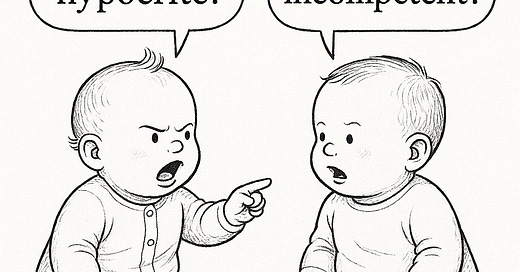The Politics of the Put-Down
Insults are everywhere: in our politics, on our timelines, across our kitchen tables. But we rarely ask why we use them—or how they’ve changed over time.
Insults are tools. Crude ones, sometimes. But still tools. And like all tools, they reveal a lot about the hands that wield them.
Insults show what we value—and what we fear. And as America’s values have shifted, so have its insults. In this piece, I want to trace that shift and offer a toolkit for those of us trying to speak persuasively, not just provocatively.
Why We Insult (Spoiler: It’s Not Just to Be Mean)
There are three main purposes to an insult:
To make yourself feel better. (Cathartic, yes. Persuasive? No.)
To make someone else feel worse. (Temporarily satisfying. Still not persuasive.)
To change someone’s mind or behavior. (Surprisingly common… and surprisingly ineffective.)
Let’s focus on that third use. Because if you’re trying to win the argument—or win back a democracy—old insults won’t cut it.
The Evolution of Insults in American Culture
Below are five insult archetypes. Each one reflects the values of its moment. The earliest are blunt-force tools. The newest are more nuanced—and potentially more dangerous.
1. Ignorance
The classics: “Stupid.” “Dumb.” “Low IQ.”
Donald Trump used the word “dumb” over 240 times on Twitter alone, according to The Guardian’s insult tracker. Hillary Clinton noted this trend in a New York Times op-ed, while hurling insults many times herself.
But here’s the problem: these insults don’t work. They activate defensiveness, not dialogue. Worse, they assume that intelligence is the only value worth debating.
2. Hypocrisy
“You said X, now you’re doing Y.”
It’s a classic takedown. But in today’s political climate, hypocrisy doesn’t land like it used to. Consistency and authenticity require concentration: the audience must remember what has previously occurred. However, the pace of new information overwhelms our ability or desire to hold these recollections.
Even on high-traffic platforms like X or BlueSky, content that “exposes” hypocrisy tends to preach to the choir. It’s more an endorphin dunk than dialogue to create change.
3. Elitism
Once a compliment, now a curse word.
Both the Left and Right love this insult. For Bernie Sanders and AOC, elites are billionaires and bankers. For Trump and J.D. Vance, elites are coastal liberals and intellectuals. (Sometimes both.)
It’s effective because it taps into our resentment about what we do not have and makes people feel like someone’s looking down on them. But it rarely invites a solution. It only builds walls. It also makes the assumption that elites have different motivations and concerns from the rest of us.
4. Tribalism
“You’re not one of us.”
This is the insult that divides communities, not just parties. It’s not about what you believe. It’s about who you are. Academic research—from social identity theory to affective polarization—shows how deep this divide runs.
The danger? When politics becomes tribal, it ceases to be negotiable. More importantly, the tribe counts its victories, regardless of these actions’ values, principles, or impact.
5. Transactionalism
“You’re getting screwed.”
This insult reframes public life as a rigged deal. “Why pay taxes if you don’t get anything back to you?” “Why let other countries benefit from our trade?” “Why support a system that takes more from me than it gives me?”
It’s the Uber-ization of civic life. Even relationships become transactional. May I borrow your mower? No, but you can rent it on NextDoor. Can you give me a ride? No, call an Uber.
As wages stagnate and trust erodes, as we move from communities to economies, this insult hits harder. And it’s used across the spectrum. The Right wraps it in tariffs and taxes. The Left wraps it in student loans and healthcare debt.
6. Incompetence
“You are terrible at this.”
This insult wraps many of the prior insults into one. By telling someone that they are not effective, you saying that they are dumb, that they cannot do what they say they can do, that they think that they are high performers, and that the results of their actions will hurt me.
Even if supported with evidence, this insult can be dismissed if delivered by a person from the other tribe.
Escaping Insults
Most insults won’t win arguments.
What we need isn’t better insults. It’s better narratives that are more persuasive, affirming the dignity of the speaker and the listener. Narratives that reward the speaker’s curiosity about how other people actually perceive what we say. They aim to change opinions, not reinforce self-righteousness.
I’m not arguing for civility. That horse has left the barn. Instead, I would like our conversations about politics to actually change opinions in order to change actions.
What do you think?
Have you noticed a shift in how people insult each other? What kinds of comments actually change your mind? Hit reply or drop a comment.



